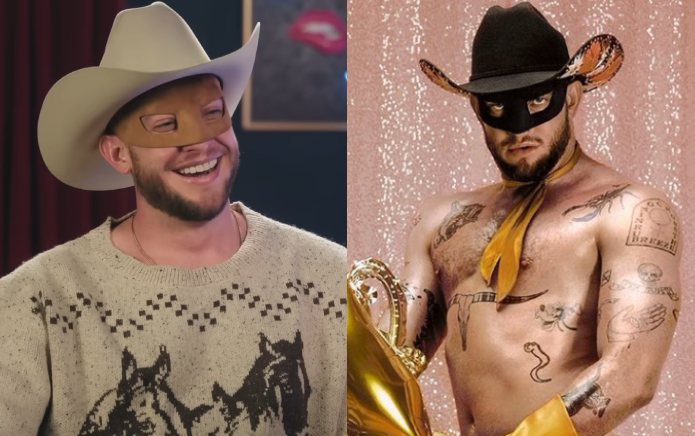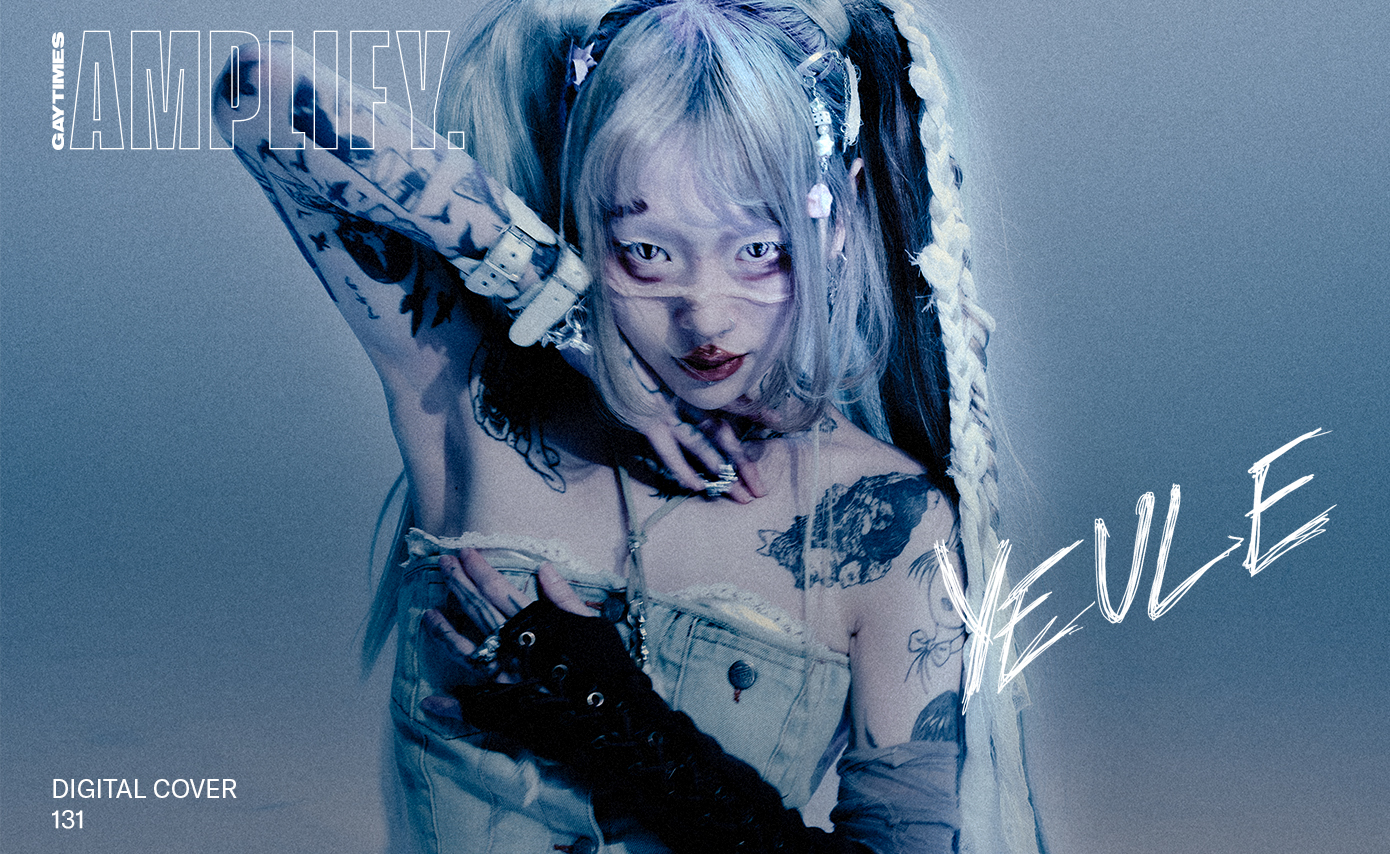
“Oh my god, I love your My Chemical Romance t-shirt!” Nat Ćmiel, aka yeule, exclaims through slurps of coffee. Sandwiched behind a small cafe table in a Hackney recording hub – The Premises Studios – the singer recalls their love for the New Jersey emo band, lazily pushing their fork around a breakfast plate. Frenetic pop pours from the speakers, masking their soft tone, as they begin to lament the loss of their beloved British fry-ups; “I really miss English breakfasts, you can’t get that in LA. Sometimes I need to have my silly little beans and my eggs. Good tea, too – I need to have tea every hour,” Ćmiel says. Smiling, they perkily add; “You know, an enby needs a sweet treat once in a while!”
The cluttered East London cafe is a far throw from Ćmiel’s typical digicore wilderness. Famed photos of studio users, Little Simz to Lana Del Rey, gaze over the artist’s nu-goth outfit. A self-proclaimed “Peckham girl”, Ćmiel holds a fondness for the busy city, a place they called home since 2016. But, for now, they’ve traded English architecture for the City of Angels. Still, the call to the UK’s capital has temporarily brought the artist back to discuss their glitch rock third album, softscars. Released in September, the record is a diaristic catalogue of selfhood set against a nostalgic cyber emo soundscape. Yeule blends pitched electronica, synthesised AI storytelling and shredding guitars into a sprawling post-human project. And, in its misfit heart, processed pop-punk melodies and scratchy screams archive stories of self-harm and survival.
Nostalgia and sadness are the first emotions to colour Ćmiel’s return to England; a city where they laid down their cyborg roots, online and offline, and studied Fine Arts at CSM. “I have so many memories here, it’s slippery,” they admit. “It’s like, ‘Oh my god, it’s that street where I had a breakdown.” Revisiting London reminds the artist of their previous work, as well as encounters. The singer’s 2022 sophomore album, Glitch Princess, is a dark distortion pop dive into techno-calamity, digital intimacy and decimation, where expression is not bound by identity. “‘Don’t Be So Hard on Your Own Beauty’ was written because I had a mental breakdown at The Barbican. My best friend was supposed to meet me nearby and then I got lost,” they share. “He kept telling me where he was and I didn’t know where I was. I was squatted in a corner, holed up in a ball, and he came to find me.”
Ćmiel has always had an affinity with the internet. When they were younger, they would spend hours scouring Tumblr, creating communities across the dark web and online gaming. Immersed in a digitised world, the yeule project became a mutable avatar allowing them to blur the lines between reality and fantasy. Adopting a Final Fantasy-inspired stage name, yeule’s clashing realms of otherness and existence are paradigmatic of their gamified, guitar-heavy sound. In recent years, Ćmiel has spent their time on the move, oscillating between intentional isolation and attempted integration into society. However, during the pandemic, the musician found themselves “living in a [remote] little house in southwest Singapore”. Away from London, the creative fell into depression and turned to making videos of music covers. “I was very depressed at the time. I was so sad because I was away from all my friends in London,” they say.
During that time, the musician went through an introspective period; “As someone who is audience facing a lot, I needed to go through some ego death stuff in 2021. I actually was scared when I was in that hole of nothingness. I was an empty shell.” A habitual self-documenter, Ćmiel fell back on saved photos from their phone – and the internet – to remind themselves of who they were. “I had no idea who I was. I didn’t know what I looked like or how to be myself anymore and this was going on for like a month,” they say. Coming out of the other side of things, Ćmiel found respite in an open network – community. “I realised having sentimental objects is one thing but having a community in my life was really important.”
While back home, the artist discreetly continued with their musical output online (a process, which Ćmiel clarifies, is for the sake of creativity outlet, not want for virality – “I wasn’t getting any views”). Overlooking the critical acclaim of their second album, Glitch Princess, and their rapidly growing audience of half a million listeners on Spotify. And so, as the singer readily shared their art without expectations: “I want to show [viewers] a part of myself that is very repressed in real life,” they say. It was during this time that Ninja Tune, an independent record label, found them. This moment, of quietly sharing content, reminded Ćmiel of when they were younger scrambling home from school to film makeshift video diary entries on their laptop. “I would have the worst day at school and be like ‘I fucking hate everything!’ I’ve always documented my life like that. Even when I was 10, I had a little camcorder that I’d carry around – I was an OG blogger. My dad did the same thing.” But, this time, they were sharing intimate songs with a handful of listeners and it paid off.
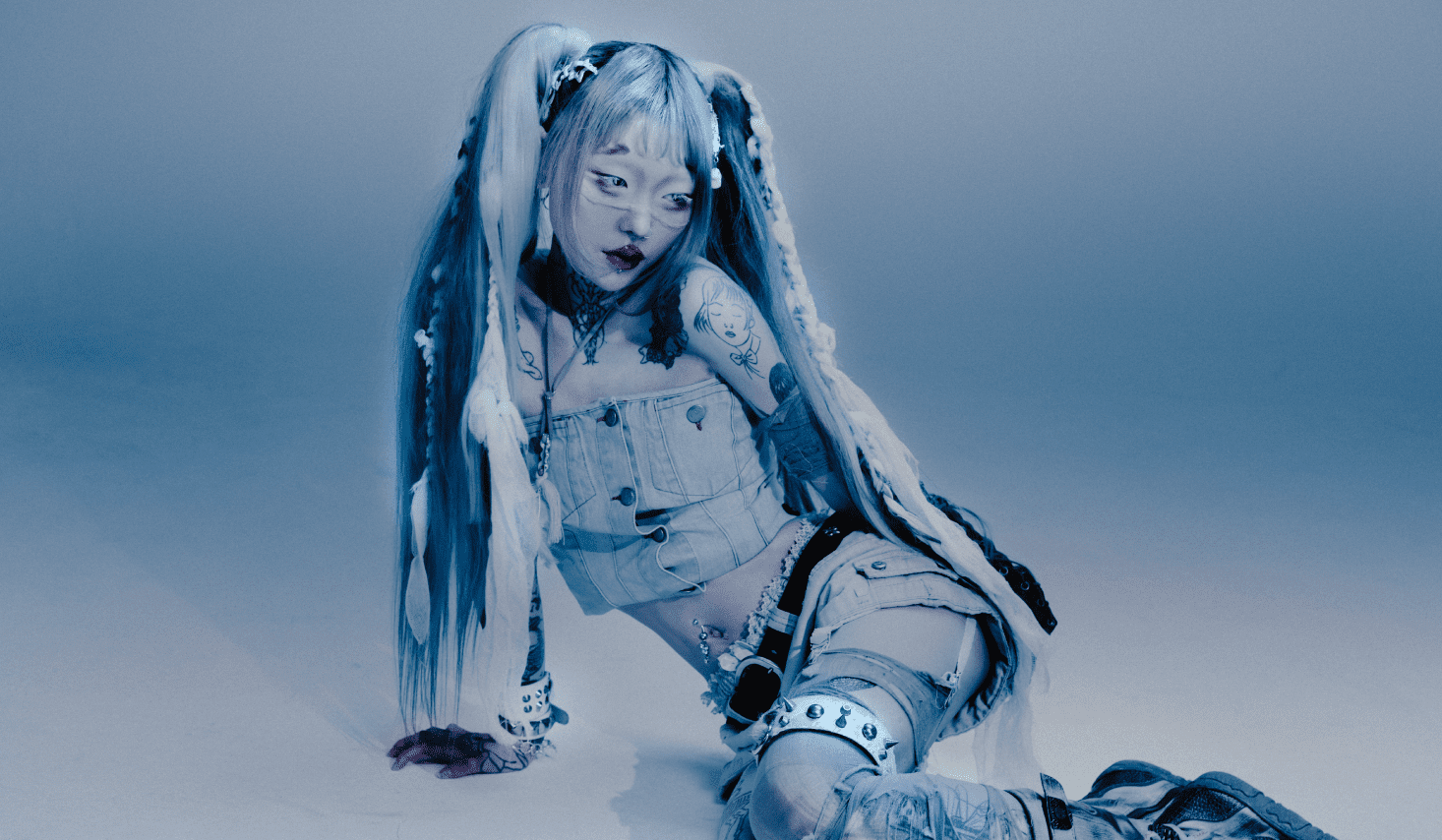
In softscars, Ćmiel continues mapping out anecdotal art. Through motifs and memories, the artist hones in on “the emotive side of the human psyche”. And, in this new project, this translates into the expression of healing through journaling and music. To capture this, the singer trawled through their old listening habits: Avril Lavigne, Smashing Pumpkins, and Hole. “I was listening to so much of what I enjoyed when I was a teenager because it made me feel that age again – that’s why I fucking vibed with you! I’m a big fan of Gerard Way. He is so pivotal to my life,” they say animatedly. “I don’t think I don’t think anyone realises how much I love My Chemical Romance or Avril Lavigne. C’mon, ‘Sulky Baby’ literally sounds like ‘Complicated’.”
Sentimentality washes through the softscars, serving as a cornerstone to the musician’s emotionality. Tightly coiled shoegaze guitar and bright punk-inspired drums splash across tracks like ‘x w x’ which wouldn’t be out of place on a Courtney Love record or, maybe even, a noisy moment on Lavigne’s early records. “My mum would always play Let Go [Avril Lavigne’s 2002 album] in the car because she knew it was my favourite. When I was 11, I fell off my bike and scraped my entire leg and that’s why I got tattoos because there was a really big scar,” they say. “She poured peroxide on my leg and I started screaming. I couldn’t stop crying, I remember, and she was like ‘let’s listen to Avril’ to stop me crying.”
Ćmiel’s reimagining of the alternative genre dimension follows a handful of Gen Z acts that have chewed up the genre and spat out their own hybrid sounds. Softscars stitches the singer’s disruptive sentient cyberpunk into visceral dark pop anthems. Their ebbing transition from glitchcore to personal electro-rock came about during a “transitional period in 2021-2022” largely inspired by emo and alternative icons of their youth. As a teenager, yeule’s “fearlessness” to dive into electronica was sparked by Grimes’ 2010 album, Halifax. From there, the artist mastered their own autonomy in producing and making music with their own stylised stamp. “It’s like picking away at a stone and into a diamond. Right now I’m really focused on the inside experiential trauma and how to heal those wounds and those scars,” they explain.
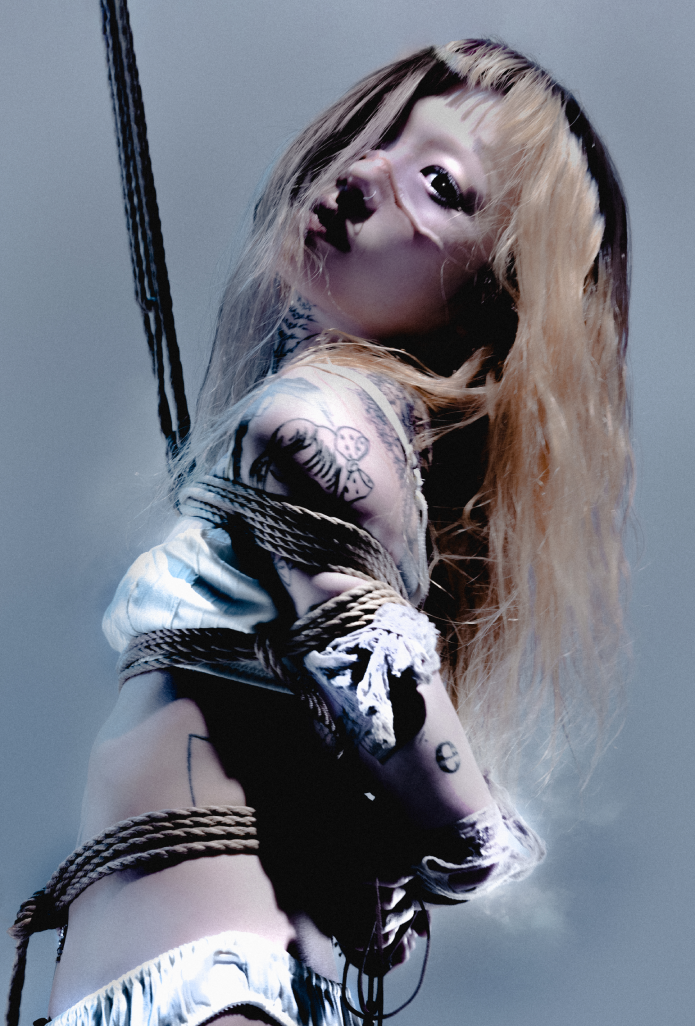
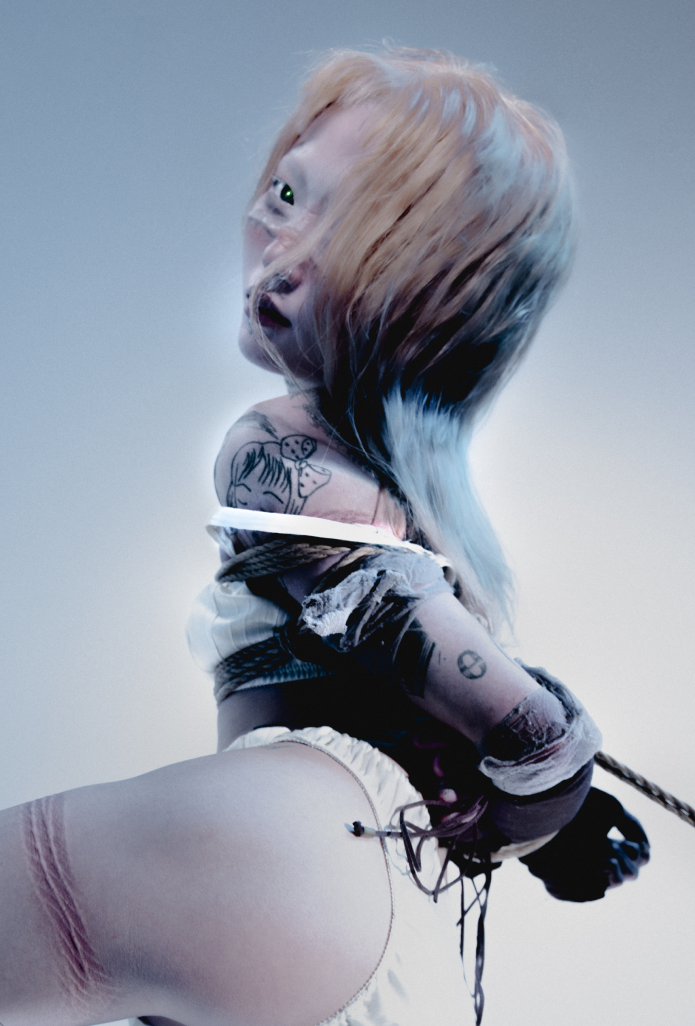
We exit the overflowing cafe, moving to a set of metal chairs outdoors and the question of their evolving sound surfaces. The 25-year-old’s chunky black boots crunch against the gravel as they muse on their creative process. “I honestly don’t know how to answer that. For me, it’s like there’s a drought and then, suddenly, there’s rain. When there’s rain, I collect as much of that water as I can,” they describe, gesturing their hands outwardly as if cradling droplets of imagery inspiration. “I drink it all and then it’s in me, I process it, and it becomes the work. It’s why I have so many bouts of depression because inspiration doesn’t always come.”
Ćmiel likens their quest for the right fit of music to divine direction. When they feel their artistic energy withering, they recognise the need to recharge. “When I have those dry spells, I feel like it’s my guardian angels trying to tell me I need to take a break. I need to have this time. If I don’t have this time, I won’t be able to receive the gifts that they, the art muse, want to bestow on me. It’s really dramatic, but I’m a very dramatic person,” they laugh.
Both Serotonin II and Glitch Princess, Ćmiel’s previous projects, plunge you into an otherworldly experience. And, in softscars, yeule entraps you further in their personal reality – a reality they are now ready to share. In ‘cyber meat’, their gruff pop-punk vocals shout: “Android blood tastes, oh, so sweet / There is a boy and girl inside me, too / Nonbinary, it’s true.” Human form to Yeule is of no relevance, as a self-described “cyborg”, but the expression of their inner mechanics holds notable value. “I’ve always sung about my gender dysphoria, but I feel like I was more literal in this record. For ‘My Name Is Nat Cmiel’, in Glitch Princess, I was talking a lot about my dysphoria, as well in ‘cyber meat’. It’s just a huge thing in my life I’ve always struggled with. I always put like 110% on me in something. I feel like my devotion and this has really shown and I just hope that it touches everyone. As much as it touches me.”
Leaning back in their chair, thinking, they slip on some black shades before outlining their affinity with augmented worldbuilding: a fascination with cybernetic theory, gender theory and, of course, fine art. “I was always good at visualising things. I was a very visual kid. I love exploring aesthetics because it tells a story of a time and it tells a story of history,” they say. Ćmiel’s creation of yeule, and all their eclectic fashion styles, seeps into their ever-evolving aestheticism that falls somewhere between the cartoon-ish zombie style of Adventure Time’s Marceline and the fierce, gutting frenzy of Mad Max. As for the emergence of softscars, the project was based on a rockier aesthetic. “I had enough for an EP to make it just that vibe. I covered Frank Ocean’s ‘Self Control’ and I was really exploring those riffs on the guitar and that’s how I wrote ‘Software Update’,” they explain. “I had never written a song like that or done vocals like that. I completely adore those avenues of music.”
Steering through clanging guitar strumming and distorted vocals, Ćmiel also draws on trauma close to home: “I have so many self-harm wounds on my arm, which are covered by tattoos. I’ve been so ashamed of them for so long. I edited them out. Only recently have I started to find them like battle wounds. They’re war, they’re scars from battle.” It’s been five years since the singer self-harmed and the idea, and image, of scars remain significant to them. The premise of their new album stemmed from their recalibrated relationship with the scarring on their skin from self-harm. When younger, the artist admits, they had difficulty embracing their scaring, but, now, that outlook changed. “I have one scarification tattoo over here. It’s slightly different from a scar, but I can see the beauty,” they say lifting an arm and drawing a finger along a black ink tattoo covering an old scar. Softscars is an alternative rock diary deposit preserving the singer’s most traumatic journal entries in song form; “Each song that I wrote for the album was based on a page of scar entry, a journal entry. When I was writing ‘softscars’, it naturally came to me because it’s soft and it’s all scars: it’s a soft scar.”
In a way, softscars is rock and roll on a flowerbed. It’s an earthy mix of electronic and shoegaze sound which uproots the past and plants Ćmiel’s new direction. So, it’s unsurprising that their jaunty blue-flamed love song ‘Inferno’ marks the departure of their past discography. “I knew I was going to depart from the electronic side. Grimes coined it cyber twee when I was showing her the demo,” they say proudly. These days, influences and idols are inevitable. For Ćmiel, Grimes stands out as the hero that pushed them on. “She’s supported me from the beginning. In 2017, I was not signed to anyone, she found me on the internet and posted me on her story. I was like ‘Holy shit, why am I getting all these followers – the Queen has spoken!” they laugh. “She’s great and gets too much shit for no reason. She’s fucking genius.” In a list of favourite artists, Arca and the “underrated” Caroline Polachek also make the cut, proudly praising both artists, paying ode to the artists who helped them chalk up the albums they’ve released to date.
Ćmiel, much like their favourite artists, creates transformative soundscapes pulling on the volatile, complicated emotions that make us whole. softscars is a fizzing mixture of synth and stacked guitars but it’s also Ćmiel’s visionary invite of letting listeners step into their own personal cyber dimensions. As the intimacy of softscars settles, Ćmiel has, unsurprisingly, already found inspiration for the future. “I’m working on the next record. There’s no title for it yet but I’m writing the songs for it. I think there’s only rain because I’m in the correct place. I feel, sometimes, it’s a huge thing to do with the place and where I am.” And, for now, in London, it seems like they are where they’re meant to be.
softscars is out now via Ninja Tune.
